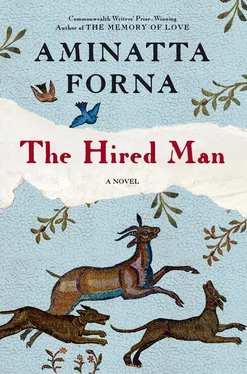Within the hour the restoration of the mosaic was complete. Then we began on the fountain, where the damage was much worse. Grace had already cleared the grass and weeds, but a great many of the tiles were loose and quite a few were damaged. Some days ago we’d lifted them all up so I could resurface the cement bed. Before we moved the tiles Grace fetched her camera and took several photographs. Afterwards she fitted the pieces back one by one, working from the digital image on the back of her camera to recreate the fish and the ribbons of weed exactly as they’d been. It had taken her hours. Now, once we fitted the tiles we’d bought in Zadar all that remained was the grouting.
Something else I should mention. The way it all fitted together, as I have said, that summer, with the sale of the blue house and the arrival of Laura who brought with her Matthew and Grace. I went to work for Laura: I needed the money and I knew the house. Small things happened, things that didn’t surprise me. Krešimir seeing the mosaics uncovered, for example. His rage. I didn’t care, in fact if anything it encouraged me, pleased to get his goat. The red hat, though, that was quite by chance; I bought it for Laura on an impulse, because I couldn’t do anything else.
The evening of the day I helped Grace with the repairs to the mosaics I saw Laura in town; she was carrying a basket, out shopping for groceries. The sun was at its lowest and struck over the rooftops and between the buildings. Laura wore a pair of sunglasses and, brim pulled down low over her forehead, the red hat. She walked alone, in a leisurely way, not at all self-conscious. I don’t know why I mention it, she’d nothing to be self-conscious about, except that she was a foreigner in a small town and other people in the same position might have been, I suppose. Laura never seemed to be able to see herself from the outside, to have an idea of what other people might think of her, or even that they might be thinking at all. She didn’t notice what happened next.
A woman walked towards her, an older woman, the kind who wore a housecoat to do her cleaning and sometimes her shopping, the same kind of woman as my mother. Head bent, trotting from one chore to the next. She looked up, saw Laura and almost stopped in her tracks. She looked down, up again, down again, nodding madly for a few moments. She slowed her pace and turned her head, following Laura’s progress; she shook her head, raised a hand and sort of tapped herself on the chest, then she bowed her head and walked quickly on.
I walked home. I relived the moment Laura turned to face me on the harbour front in Zadar: the stop it put to my heart. And just now, the woman in the street.
I thought: I am not the only one who sees it.
I want to tell you about Pag. Not that I want to dwell on it, but simply because it needs telling. Pag is part of my story, because in the end what happened on Pag brought me back to Gost. So today I’ll tell you all about Pag. I went to Pag looking for something. I was a young man, I had a dream of how life might be. I found an island surrounded by still water, an island of salt beds, upon which practically nothing grew except sage, of white churches standing alone in an empty landscape and slim, black snakes. I found the house I had been looking for, facing the sea with a stone wall around a patch of land and a slipway for a boat. The first few weeks I spent repairing the stone wall, fitting the rocks against each other, building my new life piece by piece. Inside the stone walls I built the hives that would house my bees. Each day brought something new: a pair of juvenile seagulls waiting for their mother under the broken hull of an upturned boat; she never came, I fed them and in less than a week they treated me as their step-parent and began to shriek at the sound of my tread. Another day, picking my way along the rocks on the shore, I found a pair of women’s shoes. They must have been there for a very long time: the soles were curled and the leather cracked and broken. That there were two was strange. They couldn’t have been washed up, but must have been left there, as though the owner had removed them and set them there, walked into the sea.
Then after six months of solitude, sleeping and waking with the light and darkness, with only an occasional candle, the only female in my life my queen, I met a woman and she became everything to me.
The way I met her was quite comic. In the tourist season, in Zadar, I sat in a café with my back to the wall and drank a beer. The room was full of men, it was that time of the day. A woman appeared. She wore white sandals with high cork soles and walked on strong legs and with deliberate strides across the room where she pulled out a chair, smoothed her skirt and joined me at my table. She sat with her handbag on her lap and her fingers on the clasp and nodded briskly in my direction as if she was now ready for me to say something. Because I was confused, I offered her a beer. When it came, she drank some of it and continued to look at me in the same expectant manner and so I asked her name and she told me; in return I told her mine and I made some conversation, I forget about what. I wondered if she was a very well-mannered hooker. Something I said flustered her and she gathered up her belongings, apologised, said she’d made a mistake and was gone. Her beer sat unfinished on the table. A case of mistaken identity. When I saw her in the same bar a fortnight later I introduced myself. She remembered me and blushed, but accepted another beer. In the time we were together she never did tell me who the man was she was supposed to meet, only that it had something to do with work.
She was older than me and separated from her husband. That’s why she’d been looking for work. Her ex-husband was deputy manager of a shoe factory. Her family came from Pag, and it was to Pag she returned at the end of her marriage. Her parents didn’t approve of me because there was a child who now lived with his father. They wanted their daughter to go back to the shoe factory deputy manager and the child. But she didn’t, instead she moved into my cottage. By then I’d begun to cure skins: sheep’s, goats’, rabbits’. Some I used to cover the floor of the house, some I sold and used the money to buy things, things I hadn’t given much thought to before, but came to want because she wanted them and I wanted to give them to her: patterned dishes, new chairs, aluminium pots.
She loved me, she said so. At times she was as playful as a child and at other times she would withdraw her affection for days. I didn’t ask why. It was my first adult relationship. You’d think I might know better, being raised with women, but sisters are different to lovers. Because I loved her, I let her be. But her melancholy grew. I didn’t understand, because the life I thought we had was good. And because I didn’t understand, I thought it must be sadness for her child, who lived with his father in a distant town.
The smell of the cured leather reminded her of the shoe factory, she said. So I took away the skins and bought wool rugs instead. Another day she asked me where the skins were, and wanted them put back.
One day, after we had been together for three months and the good weather had gone, I went to Zadar with a bundle of freshly cured skins. We motored in our small boat to the village near by where I could catch a lift across the small stretch of water to Karlobag, and from there hitch to Zadar. I turned to wave as she motored away from me (I had taught her to manage the boat, so she wouldn’t be stranded on days when I wasn’t there), saw her lift her hand and wave to me. The next day I stood in the same place, the money from the sale of the skins in my pocket. I found the boat moored by the jetty, but no sign of her. I knocked on the doors of the houses and learned she had gone away, on the ferry. I went home to an empty house. I wondered whether she had left straight away, or whether we had passed somewhere upon the straits. I wondered whether she stood out on the deck in the wind, with Pag behind her, whether she followed the progress of every oncoming boat and wondered if I was on it, or whether she hid below deck.
Читать дальше












